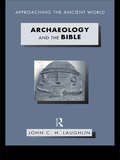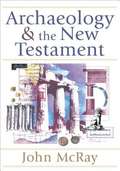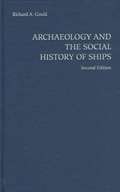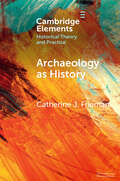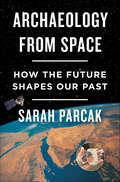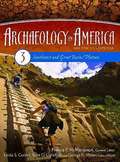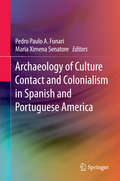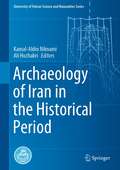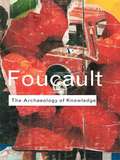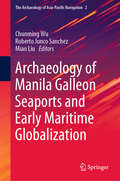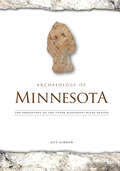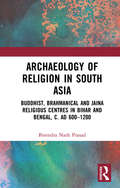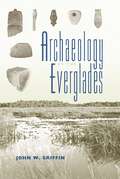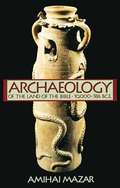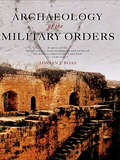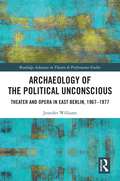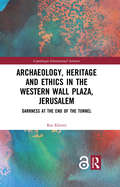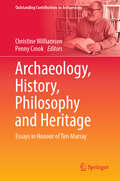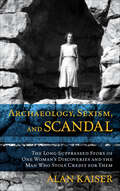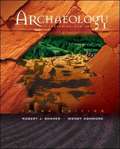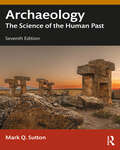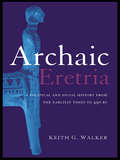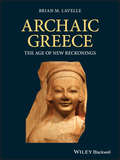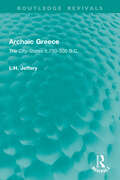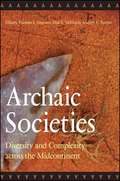- Table View
- List View
Archaeology and the Bible (Approaching the Ancient World)
by John LaughlinThis book challenges readers to consider whether archaeology explains the Bible.Archaeology and the Bible examines new developments in archaeological finds in the Near East, particularly Palestine, that are related to the Bible. New methodologies, regional surveys and creative syntheses have all had an impact on traditional approaches to looking at these discoveries. John Laughlin examines these new developments and discusses what they imply for biblical studies.
Archaeology and the New Testament
by John McRayAs he tours sites associated with the ministry of Jesus, the journey of Paul, and the seven churches of Revelation, he shows the pervasive influence of society, architecture, and religion on the peoples of the first century and on the New Testament.
Archaeology and the Social History of Ships
by Richard A. GouldMaritime archaeology deals with shipwrecks and is carried out by divers rather than diggers. It embraces maritime history and analyses changes in shipbuilding, navigation and seamanship and offers fresh perspectives on the cultures and societies that produced the ships and sailors. Drawing on detailed past and recent case studies, Richard A. Gould provides an up-to-date review of the field that includes dramatic new findings arising from improved undersea technologies. This second edition of Archaeology and the Social History of Ships has been updated throughout to reflect new findings and new interpretations of old sites. The new edition explores advances in undersea technology in archaeology, especially remotely operated vehicles. The book reviews many of the major recent shipwreck findings, including the Vasa in Stockholm, the Viking wrecks at Roskilde Fjord and the Titanic.
Archaeology as History: Telling Stories from a Fragmented Past (Elements in Historical Theory and Practice)
by Catherine J. FriemanThis Element volume focuses on how archaeologists construct narratives of past people and environments from the complex and fragmented archaeological record. In keeping with its position in a series of historiography, it considers how we make meaning from things and places, with an emphasis on changing practices over time and the questions archaeologists have and can ask of the archaeological record. It aims to provide readers with a reflexive and comprehensive overview of what it is that archaeologists do with the archaeological record, how that translates into specific stories or narratives about the past, and the limitations or advantages of these when trying to understand past worlds. The goal is to shift the reader's perspective of archaeology away from seeing it as a primarily data gathering field, to a clearer understanding of how archaeologists make and use the data they uncover.
Archaeology from Space: How the Future Shapes Our Past
by Sarah ParcakWinner of Archaeological Institute of America's Felicia A. Holton Book Award • Winner of the Phi Beta Kappa Prize for Science • An Amazon Best Science Book of 2019 • A Science Friday Best Science Book of 2019 • A Kirkus Reviews Best Nonfiction Book of 2019 • A Science News Best Book of 2019 • Nature's Top Ten Books of 2019 "A crash course in the amazing new science of space archaeology that only Sarah Parcak can give. This book will awaken the explorer in all of us." ?Chris Anderson, Head of TEDNational Geographic Explorer and TED Prize-winner Dr. Sarah Parcak gives readers a personal tour of the evolution, major discoveries, and future potential of the young field of satellite archaeology. From surprise advancements after the declassification of spy photography, to a new map of the mythical Egyptian city of Tanis, she shares her field’s biggest discoveries, revealing why space archaeology is not only exciting, but urgently essential to the preservation of the world’s ancient treasures.Parcak has worked in twelve countries and four continents, using multispectral and high-resolution satellite imagery to identify thousands of previously unknown settlements, roads, fortresses, palaces, tombs, and even potential pyramids. From there, her stories take us back in time and across borders, into the day-to-day lives of ancient humans whose traits and genes we share. And she shows us that if we heed the lessons of the past, we can shape a vibrant future. Includes Illustrations
Archaeology in America: An Encyclopedia, Volume 3 Southwest and Great Basin/Plateau
by Francis P. McManamon Linda S. Cordell Kent G. Lightfoot George R. MilnerThis section of Archaeology in America includes essays about archaeological sites in the Southwest region of North America. The articles in the Southwest section of Archaeology in America include eleven general essays on topics that cover ancient or historic time periods. The general essays are followed by fifty-one essays on specific archaeological sites or about archaeological sites in a particular region.
Archaeology of Culture Contact and Colonialism in Spanish and Portuguese America
by Pedro Paulo A. Funari Maria Ximena SenatoreThe volume contributes to disrupt the old grand narrative of cultural contact and colonialism in Spanish and Portuguese America in a wide and complete sense. This edited volume aims at exploring contact archaeology in the modern era. Archaeology has been exploring the interaction of peoples and cultures from early times, but only in the last few decades have cultural contact and material world been recognized as crucial elements to understanding colonialism and the emergence of modernity. Modern colonialism studies pose questions in need of broader answers. This volume explores these answers in Spanish and Portuguese America, comprising present-day Latin America and formerly Spanish territories now part of the United States. The volume addresses studies of the particular features of Spanish-Portuguese colonialism, as well as the specificities of Iberian colonization, including hybridism, religious novelties, medieval and modern social features, all mixed in a variety of ways unique and so different from other areas, particularly the Anglo-Saxon colonial thrust. Cultural contact studies offer a particularly in-depth picture of the uniqueness of Latin America in terms of its cultural mixture. This volume particularly highlights local histories, revealing novelty, diversity, and creativity in the conformation of the new colonial realities, as well as presenting Latin America as a multicultural arena, with astonishing heterogeneity in thoughts, experiences, practices, and, material worlds.
Archaeology of Iran in the Historical Period (University of Tehran Science and Humanities Series)
by Kamal-Aldin Niknami Ali HozhabriThis collection of twenty-eight essays presents an up-to-date survey of pre-Islamic Iran, from the earliest dynasty of Illam to the end of Sasanian empire, encompassing a rich diversity of peoples and cultures. Historically, Iran served as a bridge between the earlier Near Eastern cultures and the later classical world of the Mediterranean, and had a profound influence on political, military, economic, and cultural aspects of the ancient world. Written by international scholars and drawing mainly on the field of practical archaeology, which traditionally has shared little in the way of theories and methods, the book provides crucial pieces to the puzzle of the national identity of Iranian cultures from a historical perspective. Revealing the wealth and splendor of ancient Iranian society – its rich archaeological data and sophisticated artistic craftsmanship – most of which has never before been presented outside of Iran, this beautifully illustrated book presents a range of studies addressing specific aspects of Iranian archaeology to show why the artistic masterpieces of ancient Iranians rank among the finest ever produced. Together, the authors analyze how archaeology can inform us about our cultural past, and what remains to still be discovered in this important region.
Archaeology of Knowledge (Routledge Classics)
by Michel FoucaultIn France, a country that awards its intellectuals the status other countries give their rock stars, Michel Foucault was part of a glittering generation of thinkers, one which also included Sartre, de Beauvoir and Deleuze. One of the great intellectual heroes of the twentieth century, Foucault was a man whose passion and reason were at the service of nearly every progressive cause of his time. From law and order, to mental health, to power and knowledge, he spearheaded public awareness of the dynamics that hold us all in thrall to a few powerful ideologies and interests. Arguably his finest work, Archaeology of Knowledge is a challenging but fantastically rewarding introduction to his ideas.
Archaeology of Manila Galleon Seaports and Early Maritime Globalization (The Archaeology of Asia-Pacific Navigation #2)
by Chunming Wu Roberto Junco Sanchez Miao LiuThis book focuses on the archaeological and historical research on the seaport heritage of galleon navigation in Asia-Pacific region. It reconstructs the Manila Galleons’ era of early maritime globalization, established and operated by Spanish navigators from the 16th to 19th centuries. The galleons sailed across the Pacific via the hub seaports and trade centers of Manila in the Philippines and Acapulco in Mexico, forming a prosperous sea route connecting eastern Asia and New Spain on the American continent for more than 250 years. This pioneering navigation of the pan-Pacific regions promoted early global maritime trade along the new Maritime Silk Road between the East and the West.Written by archaeologists and cultural historians from America, Mexico, Japan, the Philippines, Mainland China, Hong Kong and Taiwan, it presents the latest investigations and research on the galleon-affiliated seaports, including Acapulco and San Blas in Mexico, Guam, Manila in Philippines, Yuegang (Crescent Harbor), Xiamen (Amoy), Keelung and Macao in China, Nagasaki in Japan. This joint research sheds new light on the history of navigation and maritime trade between galleon-affiliated harbors; the origin, production, transport and trade of the galleon cargo; social cultural exchange along the new Maritime Silk Road in the pan-Pacific region; and the history of maritime globalization in last 500 years. It offers a new perspective on maritime archaeology and traces the different stages of the galleon trade and affiliated maritime history, including "Yuegang Outbound", "Manila Entrepotting" and "Bound for Acapulco", presenting a panoramagram of Spanish pan-Pacific trade and early maritime globalization.
Archaeology of Minnesota: The Prehistory of the Upper Mississippi River Region
by Guy GibbonHistories of Minnesota typically begin with seventeenth-century French fur traders exploring the western shores of Lake Superior. And yet, archaeology reveals that Native Americans lived in the region at least 13,000 years before such European incursions. Archaeology of Minnesota tells their story—or as much as the region&’s wealth of artifacts, evidence of human activity, and animal and plant remains can convey.From archaeological materials, Guy Gibbon reconstructs the social, economic, and political systems—the lifeways—of those who inhabited what we now call Minnesota for thousands of years before the first contact between native peoples and Europeans. From the boreal coniferous forests to the north, to the tall grass prairie to the west and southwest, to the deciduous forest to the east and southeast, the richly diverse land of the upper Mississippi River region, crossed and bordered by all manner of waterways, was a virtual melting pot of prehistoric cultures.Demonstrating how native cultures adapted and evolved over time, Gibbon provides an explanation that is firmly rooted in the nature of local environments. In doing so, he shows how the study of Minnesota archaeology is relevant to a broader understanding of long-term patterns of change in human development throughout the world.
Archaeology of Religion in South Asia: Buddhist, Brahmanical and Jaina Religious Centres in Bihar and Bengal, c. AD 600–1200
by Birendra Nath PrasadIn the religious landscape of early medieval (c. AD 600-1200) Bihar and Bengal, poly-religiosity was generally the norm than an exception, which entailed the evolution of complex patterns of inter-religious equations. Buddhism, Brahmanism and Jainism not only coexisted but also competed for social patronage, forcing them to enter into complex interactions with social institutions and processes. Through an analysis of the published archaeological data, this work explores some aspects of the social history of Buddhist, Brahmanical and Jaina temples and shrines, and Buddhist stūpas and monasteries in early medieval Bihar and Bengal. This archaeological history of religions questions many ‘established’ textual reconstructions, and enriches our understanding of the complex issue of the decline of Buddhism in this area. Please note: Taylor & Francis does not sell or distribute the Hardback in India, Pakistan, Nepal, Bhutan, Bangladesh and Sri Lanka.
Archaeology of the Everglades (Florida Museum of Natural History: Ripley P. Bullen Series)
by John W. Griffin Patricia C. Griffin"An important book about a natural World Heritage site that also has a rich human heritage."--American Archaeology "As the only available synthesis of the archaeology of the Everglades, this book fills an important niche."--Choice "Adds immeasurably to our knowledge of South Florida archaeology."--Journal of Field Archaeology "Offers a vivid glimpse into a rich cultural past in an oftentimes misunderstood and overlooked region of our country."--H-Net "Detailed descriptions of archaeological surveys and test excavations dovetail nicely with broader chapters on settlement, subsistence, and social organization. This is a valuable reference work."--SMRC Revista "An extremely important work. . . . John has brought his unprecedented knowledge of the archaeology together with his anthropological and ecological insights, to provide the most thorough synthesis of the predrainage aboriginal use of this area. Now that Congress has mandated the restoration of the Everglades . . . this book will provide researchers as well as the general public with an understanding of what the Everglades were like prior to drainage and how humans utilized this natural wonder."--Randolph J. Widmer, University of Houston Originally prepared as a report for the National Park Service in 1988, Griffin's work places the human occupation of the Everglades within the context of South Florida's unique natural environmental systems. He documents, for the first time, the little known but relatively extensive precolumbian occupation of the interior portion of the region and surveys the material culture of the Glades area. He also provides an account of the evolution of the region's climate and landscape and a history of previous archaeological research in the area and fuses ecological and material evidence into a discussion of the sequence and distribution of cultures, social organization, and lifeways of the Everglades inhabitants. Milanich and Miller have transformed Griffin's report into an accessible, comprehensive overview of Everglades archaeology for specialists and the general public. Management plans have been removed, maps redrawn, and updates added. The result is a synthesis of the archaeology of a region that is taking center stage as various state and federal agencies cooperate to restore the health of this important ecosystem, one of the nation's most renowned natural areas and one that has been designated a World Heritage Site and a Wetland of International Importance. This book will make a key work in Florida archaeology more readily available as a springboard for future research and will also, at last, allow John Griffin's contribution to south Florida archaeology to be more widely appreciated. John W. Griffin, a pioneer in Florida archaeology, was an archaeologist for both the Florida Park Service and the National Park Service (NPS), director of the NPS Southeast Archeological Center in Macon, Georgia, and director of the St. Augustine Preservation Board. Jerald T. Milanich is emeritus professor at the University of Florida/Florida Museum of Natural History and author of numerous books about the native peoples of the Southeast United States. James J. Miller was state archaeologist and chief of Florida’s Bureau of Archaeological Research for twenty years and is now a consultant in heritage planning. A volume in the Florida Museum of Natural History: Ripley P. Bullen Series
Archaeology of the Land of the Bible
by Amihai MazarNotes to Reader: I did not read this carefully to correct. I did format the table of contents so it would be readable; put in page breaks, making sure that no first or last lines of the page were missing and that they followed as they should; scanned and put in missing pages and deleted duplicated pages; described some of the illustrations ( descriptions in brackets are mine). I had the spell-check on as I went, so where I found errors I corrected them but actually it was a very good scan. I did nothing with the indices or end-of-chapter notes. I think they're readable as they are-the scanner seems to have validated them--but if anyone reading this book needs anything fixed let me know and I'll get the book. Whoeveer scanned and submitted this book did an excellent job. Cindy-popularplace@yahoo.com
Archaeology of the Military Orders: A Survey of the Urban Centres, Rural Settlements and Castles of the Military Orders in the Latin East (c.1120-1291)
by Adrian BoasFirst Published in 2004. Routledge is an imprint of Taylor & Francis, an informa company.
Archaeology of the Political Unconscious: Theater and Opera in East Berlin, 1967–1977 (ISSN)
by Jennifer WilliamsThis book investigates the aesthetic and political dialectics of East Berlin to argue how its theater and opera stages incited artists to act out, fuel, and resist the troubled construction of political legitimacy.This volume investigates three case studies of how leading East Berlin stages excavated fragmentary materials from Weimar dramatist Bertolt Brecht’s oeuvre and repurposed them for their post‑fascist society: Uta Birnbaum’s 1967 Man Equals Man at the Berliner Ensemble, Joachim Herz’s 1977 Rise and Fall of the City of Mahagonny at the Komische Oper, and Heiner Muller’s own productions of his trailblazing plays. In each instance, reused theatrical artifacts dialectically expressed the contradictions inherent in East German political legitimacy, at once amplifying and critiquing it. Illuminated by original archival research and translations of letters and artistic ephemera published in English for the first time, and engaging with alternative East German feminist epistemologies, this book’s critical investigation of culture and political legitimacy in the shadow of Germany’s fascist past resonates beyond the Iron Curtain into the twenty‑first century. Its final chapter examines how performative artifacts influence the process of political legitimation in more recent history, ranging from Checkpoint Charlie tourism to the January 6, 2021 US insurrection.This study will be of great interest to students and scholars in theater and performance studies, art history, musicology, German studies, anthropology, and political science.
Archaeology, Heritage and Ethics in the Western Wall Plaza, Jerusalem: Darkness at the End of the Tunnel
by Raz KletterThis volume is a critical study of recent archaeology in the Western Wall Plaza area, Jerusalem. Considered one of the holiest places on Earth for Jews and Muslims, it is also a place of controversy, where the State marks ‘our’ remains for preservation and adoration and ‘theirs’ for silencing. Based on thousands of documents from the Israel Antiquities Authority and other sources, such as protocols of planning committees, readers can explore for the first time this archaeological ‘heart of darkness’ in East Jerusalem. The book follows a series of unique discoveries, reviewing the approval and execution of development plans and excavations, and the use of the areas once excavation has finished. Who decides what and how to excavate, what to preserve – or ‘remove’? Who pays for the archaeology, for what aims? The professional, scientific archaeology of the past happens now: it modifies the present and is modified by it. This book ‘excavates’ the archaeology of East Jerusalem to reveal its social and political contexts, power structures and ethics. Readers interested in the history, archaeology and politics of the Israeli-Palestinian conflict will find this book useful, as well as scholars and students of the history and ethics of Archaeology, Jerusalem, conservation, nationalism, and heritage.
Archaeology, History, Philosophy and Heritage: Essays in Honour of Tim Murray (Outstanding Contributions to Archaeology)
by Penny Crook Christine WilliamsonThis festschrift volume celebrates Tim Murray&’s significant and wide-ranging contribution to archaeological thought and practice. It includes 27 papers by Tim Murray&’s colleagues, research collaborators and students—former and current. Together these comprise a substantive and reflective contribution to Archaeology, History, Philosophy and Cultural Heritage in Australia, Oceania, China, India, the United Kingdom, Northern Europe, and North America. The collected papers in this volume tie together Murray&’s research into the history (or historiography) of archaeological thought, and his commitment to understanding the material culture of the past to &‘write history&’. They provide a cross-section of philosophical enquiries and substantive research: from epistemological studies of shared lexicons and important debates in the history of archaeological thought, to the minutae of material culture studies. Several papers explcitly and implicitly explore one of Murray&’s great interests: the role of heritage preservation in our exploration of the past, including dedicated tertiary training programs for Indigenous Australians to manage, research and protect their own Country. The book is divided into four parts: History, Archaeology, Philosophy and Heritage, offering an interdisciplinary approach to the study of the past. This volume would be of interest to archaeologists, historians, philosophers of archaeology, and heritage scholars.
Archaeology, Sexism, and Scandal: The Long-Suppressed Story of One Woman's Discoveries and the Man Who Stole Credit for Them
by Alan KaiserA true story of plagiarism, complicity, and a 1930s excavation that &“has the arresting immediacy of investigative journalism&” (The Journal of Hellenic Studies). The 1931 excavation season at Olynthus, Greece, ushered a sea change in how archaeologists study material culture—and was the nexus of one of the most egregious (and underreported) cases of plagiarism in the history of classical archaeology. In this book, Alan Kaiser draws on the private scrapbook that budding archaeologist Mary Ross Ellingson compiled during that dig, as well as her personal correspondence and materials from major university archives, to paint a fascinating picture of gender, power, and archaeology in the early twentieth century. Using Ellingson&’s photographs and letters as a guide, Kaiser brings alive the excavations led by David Robinson and recounts how the unearthing of private homes—rather than public spaces—emerged as a means to examine the day-to-day of ancient life in Greece. But as Archaeology, Sexism, and Scandal clearly demonstrates, a darker story lurks beneath the smiling faces and humorous tales: one in which Robinson stole Ellingson&’s words and insights for his own, and fellow academics looked the other way—denying her the credit she was due for more than eighty years. &“Kaiser&’s exciting and timely volume should force readers to openly confront gender-related biases in science and academia.&” —Library Journal (starred review) &“Important.&” —Publishers Weekly &“Highly recommended.&” —Choic
Archaeology: Discovering Our Past, Third Edition
by Robert J. Sharer Wendy AshmoreThis is the only textbook which is organized to follow the steps of the actual process of archaeological research in order to present the methods and theoretical frameworks of archaeology, from the planning and actual conduct of field research, to the different ways archaeological data is interpreted to produce an understanding of the past. It is also the only such textbook to give the reader a series of firsthand accounts of what its like to do archaeology, written by a variety of practicing archaeologists.
Archaeology: The Science of the Human Past
by Mark Q. SuttonArchaeology: The Science of the Human Past introduces students to the wide-ranging and fascinating world of archaeology and provides them with a comprehensive understanding of fundamental archaeological concepts and methods.The seventh edition keeps pace with the developments in archaeological science with up-to-date information on dating, artifact analyses, and remote sensing. Theoretical developments in power, gender, and cognition are also included. Introducing the key components of archaeology, including sites, artifacts, ecofacts, remote sensing, and excavation, it discusses the ways archaeologists obtain, analyze, and interpret evidence. Varying perspectives are considered to provide holistic coverage of how archaeological techniques and methods are used to formulate and test models of what happened in the past. Cultural resource management and the laws and regulations that deal with archaeology around the world are described. Archaeology is placed in the context of current topics, from environmental problems to issues affecting Indigenous populations.Archaeology: The Science of the Human Past remains an ideal introduction to archaeology by offering students a broad and clear understanding of the theoretical and scientific aspects of archaeology and how various archaeological perspectives and techniques help us comprehend not just the past but the contemporary world as well.
Archaic Eretria: A Political and Social History from the Earliest Times to 490 BC
by Keith G. WalkerThis book presents for the first time a history of Eretria during the Archaic Era, the city's most notable period of political importance and Keith Walker examines all the major elements of the city's success. One of the key factors explored is Eretria's role as a pioneer coloniser in both the Levant and the West - its early Aegaen 'island empire' anticipates that of Athens by more than a century, and Eretrian shipping and trade was similarly widespread. Eretria's major, indeed dominant, role in the events of central Greece in the last half of the sixth century, and in the events of the Ionian Revolt to 490 is clearly demonstrated, and the tyranny of Diagoras (c.538-509), perhaps the golden age of the city, is fully examined. Full documentation of literary, epigraphic and archaeological sources (most of which has previously been inaccessible to an English speaking-audience) is provided, creating a fascinating history and valuable resource for the Greek historian.
Archaic Greece: The Age of New Reckonings
by Brian M. LavelleAn introductory guide to the Archaic period in ancient Greece—the people, their society, and their culture. Excerpts from literary and other texts give voice to the interests, concerns, and emotions of the Archaic Greeks themselves. This book provides a brief but comprehensive introduction to the society and culture of the Archaic period in the Greek world from c. 750 to c. 480 BCE. It focuses on the persistent and often-conflicting themes, topics, and controversies of the Archaic Age (e.g., elite and non-elite, religion and science, tradition and humanism). It seeks to lead the reader to a broader and deeper understanding of the period by placing themes and topics in a mutually supportive contextual network that will underscore their significance. Archaic Greece: The Age of New Reckonings begins with a chapter on how sources for the period are evaluated and deployed, and goes on to offer a concise yet thorough historical overview of the Archaic period. Subsequent chapters cover polis and politics; war and violence; religion; science; philosophy; art; literature; festivals and games; social forces, values, and behaviors; and gender and sex. The book: Offers a novel approach to a very significant period that foregrounds literary evidence and the words voiced by Archaic Greeks, combining scholarship with readability; Conceptualizes Archaic Greek culture and society by focusing substantially on topics that supplement the history of the period; Combines diverse elements of society and culture, including religion, art, literature, games and festivals, gender, sexuality, and politics in order to develop a unique picture of Greece during the Archaic period; Includes a summarizing essay that draws chapters together, emphasizing the implications of their topics and themes. Archaic Greece: The Age of New Reckonings should appeal to college-level instructors as a book to assign to students enrolled in courses involving Archaic Greece and to others interested in this intriguing and pivotal period in ancient Greece.
Archaic Greece: The City-States c.700–500 B.C. (Routledge Revivals)
by L.H. JefferyArchaic Greece (1976) describes the typical polis, and considers in turn each city-state in mainland Greece, the Aegean and the coast of Asia Minor. In detailing its history and local culture, as well as events which had great impact on the period – the reforms of Solon, the expulsion of tyrants – the book shows how each contributed to the structure of Greek society as a whole.
Archaic Societies: Diversity and Complexity Across the Midcontinent
by Thomas E. Emerson Dale L. McElrath Andrew C. FortierSweeping and detailed, this long-awaited volume is an indispensable guide to the Archaic period across the midcontinent. Archaeologists throughout the region share the latest excavation results and analytical perspectives to reveal and reinterpret the worlds of those Native peoples who lived there for some 9,000 years (up to about 3,000 years ago). Of particular concern is the establishment of relative and absolute chronologies for the Archaic period, the relationships between the artifacts left behind and the peoples who made and used them, and the changing interactions between cultures, climate, and landscape. Archaeologists offer useful, up-to-date overviews of Archaic societies, assessment of stratigraphic sequences, and detailed discussions of finds and interpretations from the Mississippi and Ohio river regions and the Great Lakes. Comprehensive and accessible, this landmark book is a must for anyone wanting to understand a crucial but little-understood period in North America s prehistory.
